-
San Diego sheriff: Migrants did not try to forcefully stop school bus - August 31, 2024
-
One stabbed, another injured in altercation on L.A. Metro bus - August 31, 2024
-
Trump Judge Has ‘Two Options’ as Future of Case Unclear: Analyst - August 31, 2024
-
What to Know About Putin’s Planned Visit to Mongolia Amid ICC Arrest Warrant - August 31, 2024
-
Buying sex from a minor could be a felony under bill headed to Newsom - August 31, 2024
-
Democrat Lawmaker Switches Party to Become Republican - August 31, 2024
-
Misdated Mail-In Ballots Should Still Count, Pennsylvania Court Rules - August 31, 2024
-
Cause and manner of death determined for Lucy-Bleu Knight - August 31, 2024
-
NASCAR Craftsman Truck Series Announces Return To Iconic Circuit In 2025 - August 31, 2024
-
At Pennsylvania Rally, Trump Tries to Explain Arlington Cemetery Clash - August 31, 2024
This Riverside County man is on a mission to save California’s abandoned ducks
A warehouse in Orange County had received a late order of balut, a Southeast Asian delicacy of fertilized duck eggs, but now the warehouse had a crisis on its hands: Hundreds of the eggs were hatching.
The distributor was racked with indecision. She knew she couldn’t possibly raise hundreds of these ducklings that were meant to be eaten before birth, but now that they were out of their shells, it felt immoral to abandon them next to the dumpster to die.
So she called around, asking friends and friends of friends if they knew anyone who might be willing to take the furry creatures. That’s how she landed on The Duck Pond Inc., a waterfowl sanctuary for domesticated birds run by Howard Berkowitz.
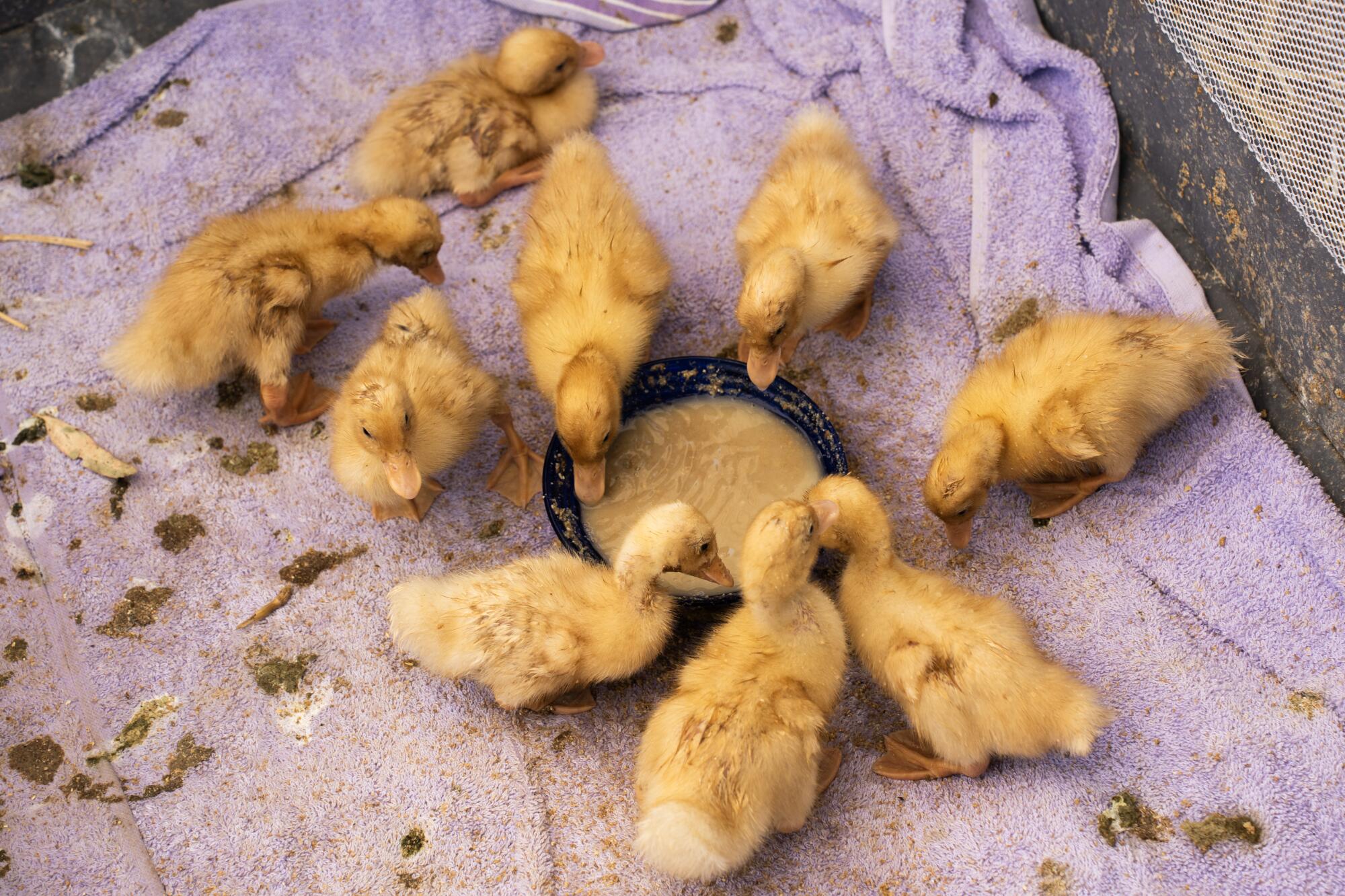
Newborn ducklings from a failed balut order feed inside a baby playpen.
(Jireh Deng / Los Angeles Times)
“This is the largest rescue we’ve been involved with,” Berkowitz said. When he picked up the baby waterfowl, he was appalled at their condition, starving and dehydrated by the Southern California heat.
“Some of them that [had] been alive for one, two or three days had zero food, zero water,” he added. Of the 350 ducklings he retrieved, only 140 were successfully nursed back to health.
A week after the rescue, Berkowitz put out a call for foster parents to care for the newborn ducks; by the end of the day, only a few scraggly dozen were left of the tiny yellow fluffy beings. Berkowitz lifted a duckling up from a playpen that was repurposed into a duck nursery. It squawked in protest as he cupped it in his palm before relaxing, relenting to his gentle caress.
Howard “Howie the Duck” Berkowitz is a bespectacled man in his 60s with a salt-and-pepper beard and curly graying hair that pokes out the sides of his baseball cap, not unlike the flicked feathers of a duck’s tail. A former biochemist and part-time classic car mechanic, he spends most of his days now answering urgent calls for duck rescues.
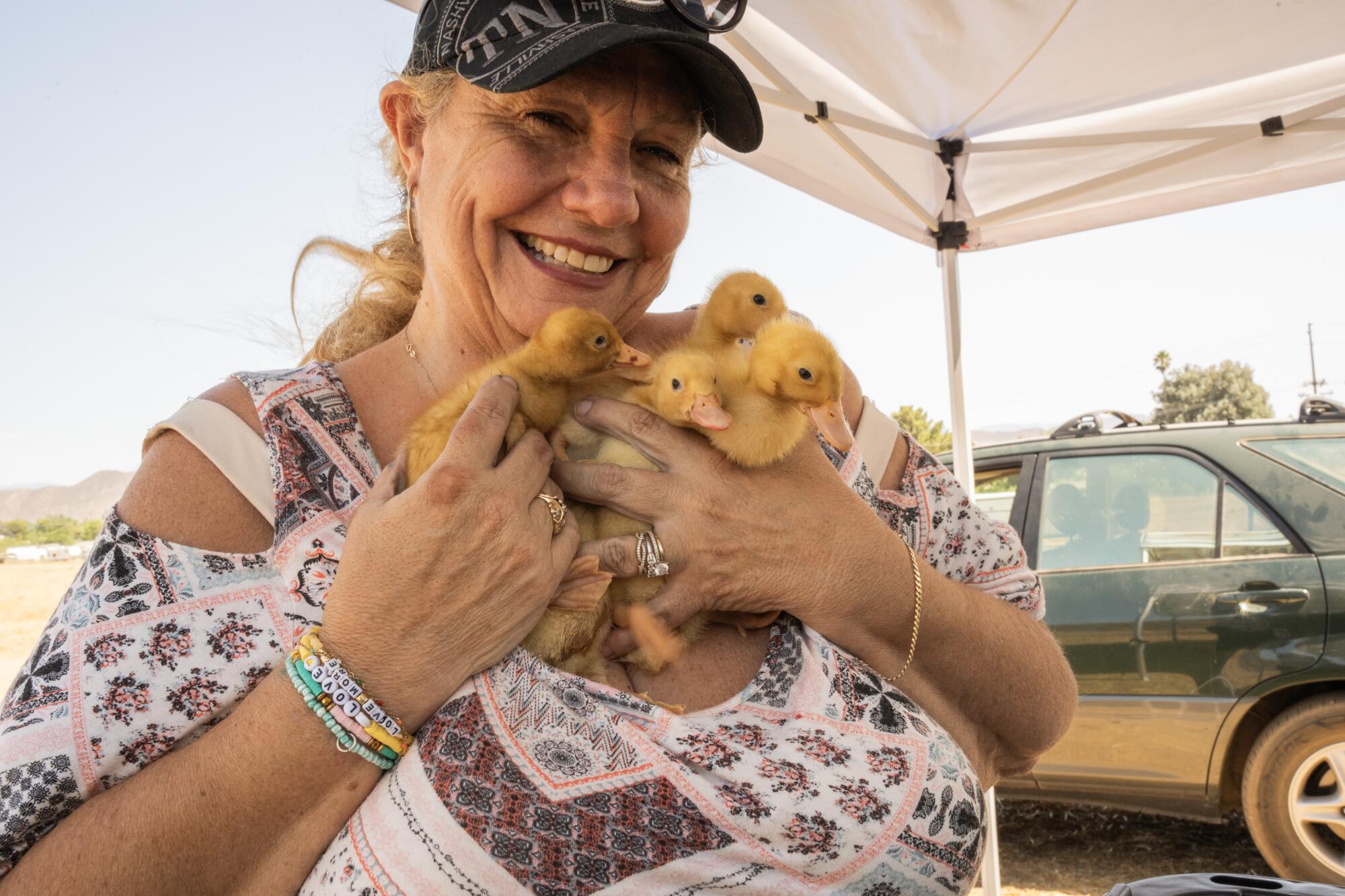
Volunteer Valerie Norris holds her foster ducklings.
(Jireh Deng/Los Angeles Times)
Berkowitz’s sanctuary, a nonprofit officially known as the Duck Pond (but also as the Duck Sanctuary), is based on less than an acre in rural Winchester in Riverside County. It’s home to a motley crew of 400 ducks, geese and chickens, including a hybrid goose that belongs to one of the world’s rarest populations of geese, the Hawaiian Nene. Berkowitz has his hands full feeding them daily and making sure their kiddie pools are replaced with clean water every few hours.
He has no children of his own, he said, so the ducks are his kids. “If something ever happens to me,” Berkowitz said, “I have a half a million dollar life insurance policy [to cover] the duck sanctuary.”
Why does he care so deeply about the plight of these waterfowl? “Birds are completely different,” Berkowitz said, citing his pet goose, Goosifer, who rides with him in the car everywhere. “When they bond with a human, you actually become part of their flock.”
With the latest rescue, Berkowitz said, he hopes the favorable media coverage will raise his visibility and help finance his work.
“We’re hoping to either find some corporate sponsorship or someone who’s willing to write a check,” said Berkowitz.
Berkowitz’s zeal for waterfowl, however, has detractors along with supporters.
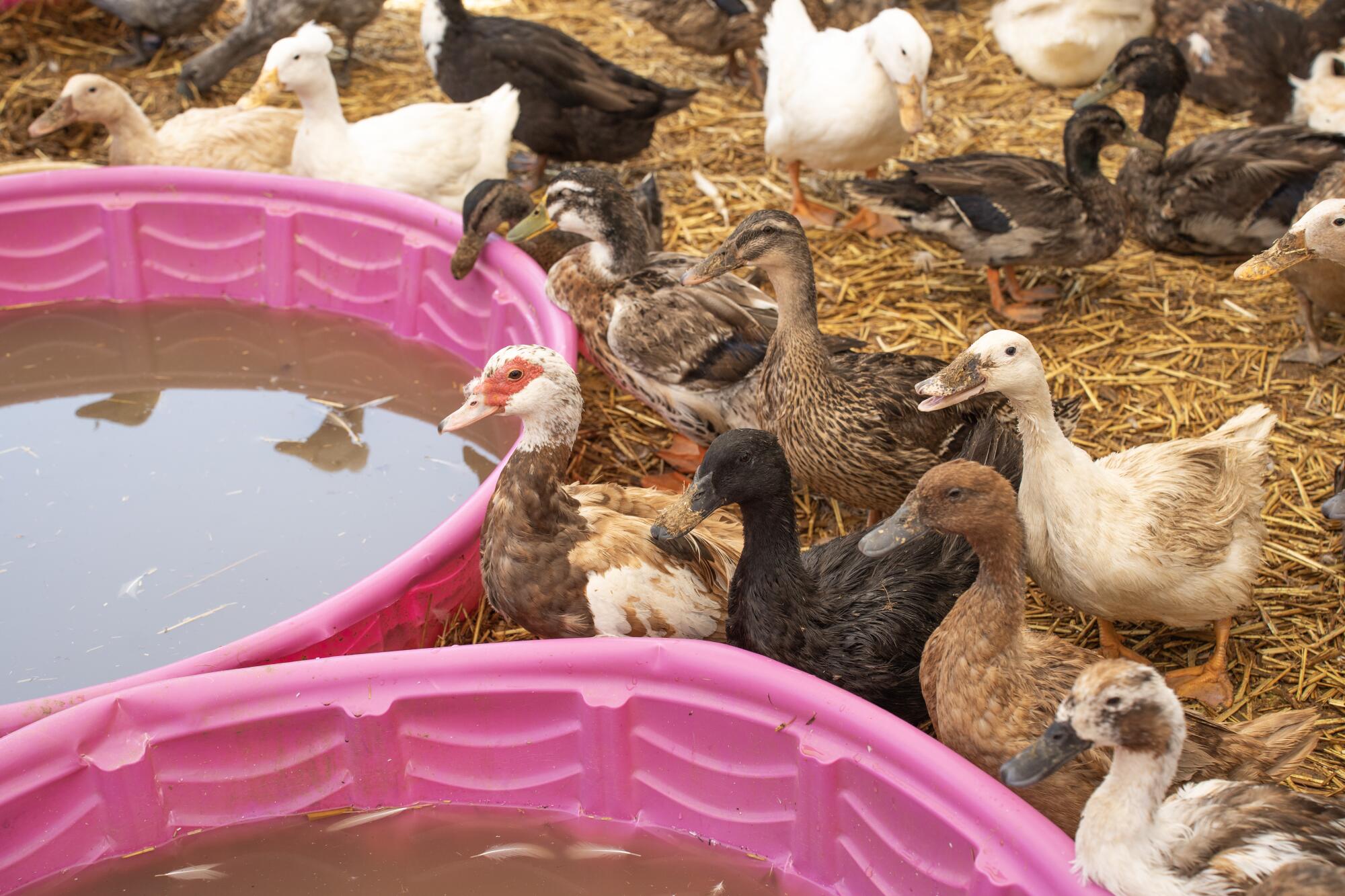
In total, the Duck Pond hosts 400 permanent residents, many of them domestic nonnative birds abandoned by former owners.
(Jireh Deng/Los Angeles Times)
“I’m actually divorced because of this. My wife couldn’t handle the responsibilities any longer,” Berkowitz said. “She left me because of the duck sanctuary.”
His operation has also drawn the ire of neighbors, who haven’t appreciated the cacophony caused by hundreds of ducks and geese.
To the casual passerby, this scrappy operation might look disorganized and cluttered. Among the sights are dozens of Amazon boxes haphazardly stacked on a picnic table and a basket of once fresh, now rotting peaches that Berkowitz hadn’t managed to feed to his ducks. Battalions of flies circle the duck pens. But to Berkowitz the untidy appearance hasn’t diminished what he sees as quality care he’s provided to his ducks.
“We’ve had animal control called on us several times,” Berkowitz said. “And animal control comes out and does their due diligence, and we’ve passed every inspection.”
The mess of the duck sanctuary is sometimes unavoidable. Ducks poop everywhere because they’re impossible to potty train — they don’t have sphincters to control when and where they defecate.
That cloudy water that the ducks swim in, drink from and treat as a toilet? Not brackish at all, according to Berkowitz, who says the ducks dig in the soil for bugs, then bring the dirt into the water. Ducks, like pigs apparently, love mud. “That is two-hour-old water.”
Berkowitz has been served notice by Riverside County code enforcement officers twice at two different locations that he has brought an “excessive” number of animals into a residential zone. Because of issues with neighbors and code enforcement, he’s had to move his original duck sanctuary from his property multiple times.
“This man had way too many ducks to take proper care of,” said Mo Middleton, chief animal control officer at Animal Friends of the Valley. She said the group has Berkowitz on a “Do Not Adopt” list barring him from taking any additional waterfowl from their shelter. “If we have ducks in here, we don’t let him take them.”
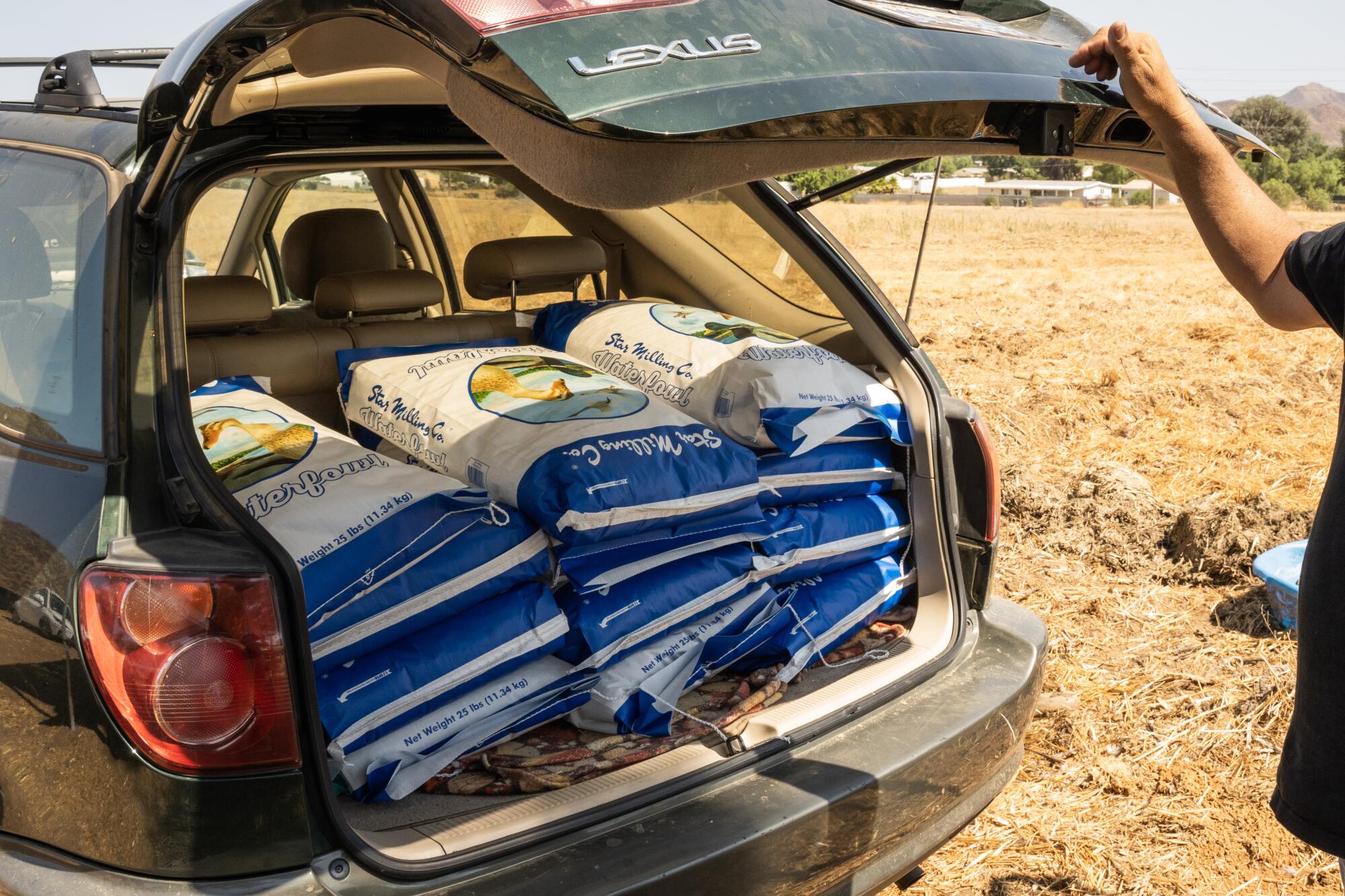
Every day Berkowitz feeds his birds 250 pounds of food, costing him $170 daily.
(Jireh Deng/Los Angeles Times)
But Berkowitz is already aware of the capacity issues at his current location in a backyard volunteered by a Winchester homeowner, and he’s in the process of selling his home to purchase 20 acres of land where his rescues will have a bigger plot to roam. GoFundMe efforts have raised him more than $17,000, but Berkowitz said he needs $200,000 to build a permanent home for his rescues.
“The dream is to have a functioning sanctuary that also has an educational center, where young people can learn about how to respect and treat animals,” said the Duck Pond’s Chief Financial Officer, Tylor Taylor.
Middleton is wary of rescuers who use the plight of abandoned animals for personal financial gain. Although the IRS recognizes the Duck Pond as a nonprofit eligible for tax-deductible donations, the organization has yet to register with the Registry of Charities and Fundarisers maintained by the state attorney general’s office. According to the attorney general’s office, “failing to register may lead to penalties, administrative or legal action, and the loss of tax exemption status with the [state] Franchise Tax Board.”
But Taylor said that as far as he knew, everything the organization is doing is legal and in compliance with the Internal Revenue Service rules since it first registered as a 501(c)(3) nonprofit two years ago. He added that the work hasn’t been profitable for Berkowitz.
“He has had to almost bankrupt himself in order to keep that place going,” said Taylor.
According to Berkowitz, he has been strapped for money since Day One. On top of water bills and food expenses of $170 a day, he has a vet bill of $3,000 to pay. He estimates spending about $1,000 of his own money each month on operations that aren’t covered by the donations to his nonprofit. He’s has had to sell more than a dozen of his antique cars to continue funding operations. On the side, he said, he still restores vintage cars for the rich and famous, which helps cover his personal expenses.
Berkowitz’s services appear to be in high demand, with nearly every day bringing another crisis to address. But while wild care facilities can often apply for conservation funding such as the California Department of Fish and Wildlife’s Wildlife Rehabilitation Grant Program, Berkowitz’s sanctuary cannot.
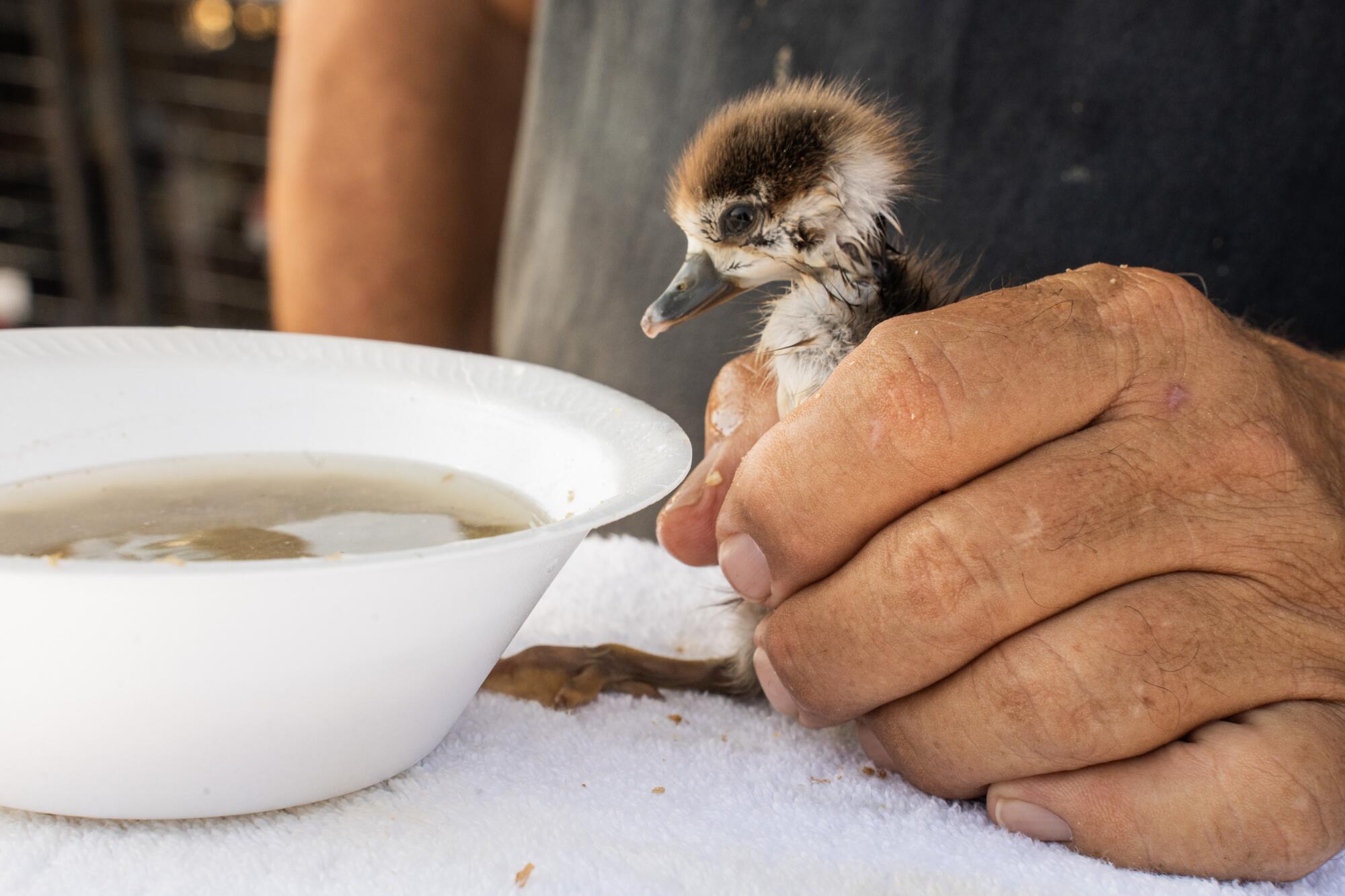
Berkowitz holds the Egyptian gosling rescued from the golf course.
(Jireh Deng / Los Angeles Times)
Debbie McGuire, executive director of the Wetlands and Wildlife Care Center, said she has worked with him for 10 years, referring nonnative waterfowl to Berkowitz’s sanctuary. She commends his dedication and will to sustain his operations almost single-handedly. When she’s visited his sanctuary, she said, she hasn’t seen any issues that would raise red flags with animal welfare.
Many duck sanctuaries have tried and failed to stay open, she said, leaving Berkowitz’s as one of the last left. “I always admire the ones that can keep going.”
Thankfully, Berkowitz said, the detractors and critics are few, and the support for his work continues. On $5 Fridays, 50 to 60 people donate to the Duck Pond. Others have donated food to the ducks; on various days he gets cabbage, watermelon and strawberries, as well as worms — a favorite of the waterfowl.
Taylor is just one of the people who originally dropped off a rescued bird only to be pulled into the orbit of Berkowitz’s work. At least a dozen volunteers take turns visiting every week to clean and feed the birds — some driving from as far as West Hollywood for two hours just to help.
“This place is amazing,” said Bunni Amburgey, who adopted several newborn ducklings. Amburgey attended junior high and high school with Berkowitz and has known him for 45 years; she said his work comes from a place of true selflessness. “Are shelters or sanctuary ever perfect?” she asked rhetorically. “No, but at least have a place to go to get vet care, get fed, be safe.”
Source link













